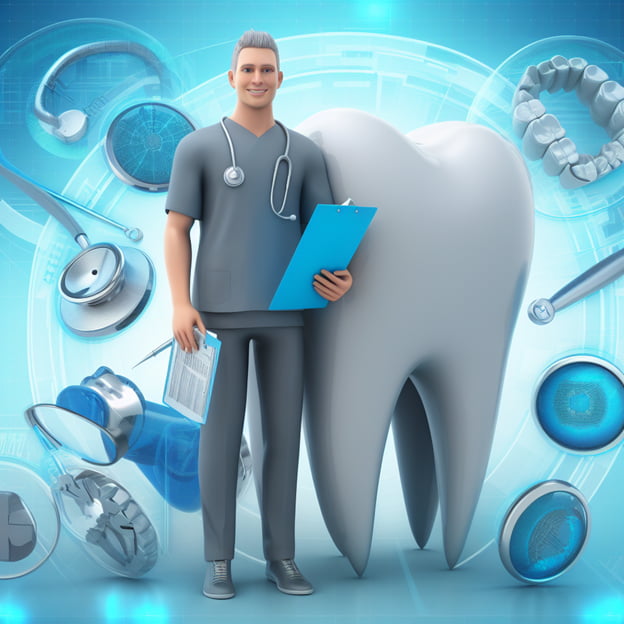Dental health myths are rampant, from whether to brush after eating to whether mouthwash replaces flossing. The truth is that flossing is crucial for cleaning between teeth where brushing can’t reach. You should change your toothbrush every three months as bristles wear down over time. Drinking soda can erode tooth enamel, but rinsing with water afterward helps. Consider getting an oral biopsy to check for signs of disease and rule out abnormal growth or soreness. Separating fact from fiction is key for proper oral health and hygiene.
Sugary Snacks Aren’t the Only Culprit
It’s common knowledge that sugary sweets like candy and soda can damage teeth and promote cavities due to the bacteria that feed on sugar residues left on your teeth. However, starchy foods like crackers, bread, pasta, and potatoes can get stuck in your teeth, break down into natural sugars, and feed decay-causing bacteria. Even seemingly healthy snacks like dried fruit and granola bars can stick to your enamel. Brushing after any snack, not just sugary, helps protect your pearly whites.
Costly Dental Work isn’t Always Necessary
Seeing your dentist for regular cleanings and checkups can help catch small problems before they balloon into expensive procedures like crowns and implants. Getting cavities filled when small or addressing issues like gum disease early saves time, discomfort, and money over delaying treatment. Don’t put off your recommended dental work out of fear it will cost a fortune–preventive care is much more affordable.
Whitening Isn’t Permanent
No matter what tooth whitening products claim, from professional treatments to drugstore strips, the effects subside over time. Gradually, substances like coffee, red wine, and tobacco can cause stains to reappear on your enamel. Occasionally, “touching up” your whitened smile may be necessary, especially if you regularly consume staining foods and drinks. Whitening treatments also work best on natural teeth–if you have extensive dental work like crowns or veneers, they will remain their original color.
Gum Disease Links to Overall Health
Swollen, painful gums that bleed easily aren’t a dental concern–they can indicate periodontal or gum disease, which research links to multiple health issues, including heart disease, dementia, diabetes complications, and premature birth. Bacteria from your mouth can enter the bloodstream if gum tissues are inflamed. Practicing good oral hygiene and having professional cleanings protects not only your smile but potentially your whole body.
Brushing Too Hard Backfires
Brushing hard gets teeth cleaner faster but can damage protective enamel and irritate gums. A soft-bristled brush and gentle, circular motions are sufficient to remove plaque without abrasion. If brushing seems like a chore, invest in an electric toothbrush designed to protect enamel–the power does the work for you! Don’t apply so much muscle that your gums bleed–that’s a red flag you’re brushing too aggressively.
Simple Steps Prevent Problems
Keeping a healthy smile doesn’t require expensive products, painful procedures, or rigorous rituals. Brushing twice daily, flossing daily, using fluoride toothpaste, rinsing with antimicrobial mouthwash, limiting acidic and sugary snacks and drinks, and seeing your dentist twice annually can prevent most dental woes. Good habits at home plus professional care equals excellent oral health for life.
Conclusion
Many myths persist about dental health, but daily brushing and flossing, regular cleanings, and checkups are key for a healthy mouth. Get an oral biopsy to determine if the abnormal tissue is cancerous. Separating fact from fiction empowers wise choices that prevent problems. With the right information, you can enjoy a bright, beautiful smile for life. Knowledge truly is power for dental health.
Did you find this helpful? Check out our other helpful articles on our website.
Read Also
- Exploring the Benefits of Infusion Therapy in OKC: The Ultimate GuideUnderstanding Infusion Therapy: A Deep Dive into Its Purpose and Process What exactly is Infusion Therapy? Infusion therapy is an advanced medical treatment that delivers medication and nutrients directly into the bloodstream through a vein, typically via an IV (intravenous) line. This method is particularly beneficial for patients who require a concentrated dose of medication,… Read more: Exploring the Benefits of Infusion Therapy in OKC: The Ultimate Guide
- Ketamine-Assisted Therapies: Impacts on Employee WellbeingWorkplace stress is common today. Many employees feel tired, anxious, or burned out. Regular therapy can help, but some people need more support. Ketamine-assisted therapy is showing good results for mental health. A ketamine-assisted therapist guides each session safely. This therapy can improve mood, focus, and energy. Learning more about it can help teams stay… Read more: Ketamine-Assisted Therapies: Impacts on Employee Wellbeing
- The Future of Men’s Health: Why Telehealth Is Here to StayTelehealth isn’t just a pandemic trend that faded into the background. For Australian men, it has become one of the most practical, time-saving, and stress-free ways to manage everyday health — and it’s shaping the future of how we access care. Platforms like DOCTO, an Australian online doctor and specialist telehealth service, are leading the… Read more: The Future of Men’s Health: Why Telehealth Is Here to Stay
- How to Build a Simple, Clean Skincare Routine ?You don’t need a complicated skincare routine. It doesn’t have to be something that requires twenty different products and confusing steps. Your routine works well with just a few high-quality clean ingredients. The beauty industry keeps pushing more products, but your skin actually needs less. You only need a simple approach to get better results… Read more: How to Build a Simple, Clean Skincare Routine ?
- How Preventive Dental Care Supports Overall HealthHave you ever wondered how a simple dental checkup could impact your entire body? Oral health is more than just a bright smile. Studies show that poor dental habits can contribute to serious health problems. Gum disease and tooth decay are linked to heart disease, diabetes, and infections. Yet, many people overlook preventive dental care.… Read more: How Preventive Dental Care Supports Overall Health
- Seeing Clearly in a High-Tech World: A Deep Dive into Advanced Vision Care ServicesProtecting your eyesight isn’t optional—it’s essential. Modern eye care has evolved far beyond basic exams, offering advanced diagnostics, personalized treatments, and surgical innovations that keep vision sharp for life. A leading example is Intermountain Eye Center, home to specialists like Dr Fishburn Boise, where patients receive comprehensive, high-level vision care designed to preserve long-term eye… Read more: Seeing Clearly in a High-Tech World: A Deep Dive into Advanced Vision Care Services
- Why the Keto Diet Works for Some People—and Fails Dramatically for Others: An Ayurvedic Breakdown for Modern HealthcareThe keto diet has dominated weight-loss culture for years. For some people, it produces rapid fat loss, stable energy, and improved mental clarity. For others—especially those who gain weight easily—it leads to burnout, digestive distress, rebound weight gain, high cholesterol, and a metabolism that feels slower than before. Healthcare often frames this as a discipline… Read more: Why the Keto Diet Works for Some People—and Fails Dramatically for Others: An Ayurvedic Breakdown for Modern Healthcare
- How to Choose the Best Assisted Living Facility for SeniorsAre you looking for the right assisted living facility for a senior loved one? Choosing a place can feel overwhelming. There are many factors to consider, from care services to the environment. Safety, comfort, and social opportunities play important roles in daily life. Each senior has unique needs and preferences that must be met. Understanding… Read more: How to Choose the Best Assisted Living Facility for Seniors









